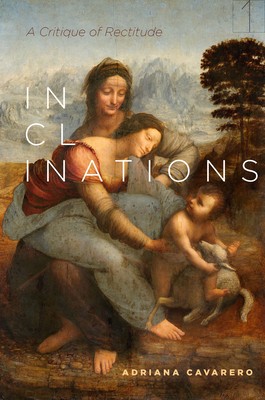
- We will send in 10–14 business days.
- Author: Adriana Cavarero
- Publisher: Stanford University Press
- ISBN-10: 0804792186
- ISBN-13: 9780804792189
- Format: 14.7 x 21.8 x 2 cm, hardcover
- Language: English
- SAVE -10% with code: EXTRA
Reviews
Description
In this new and accessible book, Italy's best known feminist philosopher examines the moral and political significance of vertical posture in order to rethink subjectivity in terms of inclination. Contesting the classical figure of homo erectus or upright man, Adriana Cavarero proposes an altruistic, open model of the subject--one who is inclined toward others. Contrasting the masculine upright with the feminine inclined, she references philosophical texts (by Plato, Thomas Hobbes, Immanuel Kant, Hannah Arendt, Elias Canetti, and others) as well as works of art (Barnett Newman, Leonardo da Vinci, Artemisia Gentileschi, and Alexander Rodchenko) and literature (Marcel Proust and Virginia Woolf).
EXTRA 10 % discount with code: EXTRA
The promotion ends in 18d.02:21:20
The discount code is valid when purchasing from 10 €. Discounts do not stack.
- Author: Adriana Cavarero
- Publisher: Stanford University Press
- ISBN-10: 0804792186
- ISBN-13: 9780804792189
- Format: 14.7 x 21.8 x 2 cm, hardcover
- Language: English English
In this new and accessible book, Italy's best known feminist philosopher examines the moral and political significance of vertical posture in order to rethink subjectivity in terms of inclination. Contesting the classical figure of homo erectus or upright man, Adriana Cavarero proposes an altruistic, open model of the subject--one who is inclined toward others. Contrasting the masculine upright with the feminine inclined, she references philosophical texts (by Plato, Thomas Hobbes, Immanuel Kant, Hannah Arendt, Elias Canetti, and others) as well as works of art (Barnett Newman, Leonardo da Vinci, Artemisia Gentileschi, and Alexander Rodchenko) and literature (Marcel Proust and Virginia Woolf).


Reviews